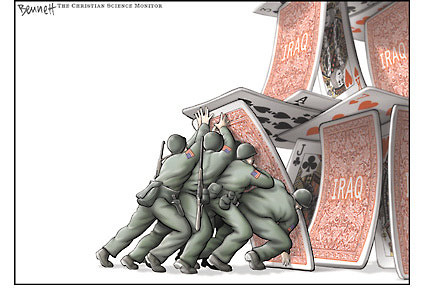
In backing a "surge" of fresh troops into Iraq, the George W Bush administration is trying to keep up the illusion that "victory" is still possible even though the leaders themselves have given up on it. Their real battle plan draws on Henry Kissinger's tried and tested strategy for surviving defeat: hang on until 2009 and blame the Democrats for stabbing the troops in the back.
By Gareth Porter
Asia Times
".....The biggest backfire of such a policy would come as a result of a major political and military confrontation with militant Shi'ites in Baghdad and in southern Iraq. Lieutenant-General Ray Odierno told reporters he expects US troops to go into the massive Baghdad district known as Sadr City, because it is populated by working-class Shi'ites loyal to the radical cleric Muqtada al-Sadr.
If the United States does provoke a battle with Muqtada's Mehdi Army, there will undoubtedly be a major spike in battle deaths and in civilian casualties. The fighting also might well unhinge the highly tenuous arrangements that keep the Iraqi government from collapsing......
The sudden emergence of Kissinger as a key figure in Bush's Iraq policy deserves closer examination. Although he knows very little about how to deal with Sunnis and Shi'ites, Kissinger does know how to convey to the public the illusion of victory, even though the US position in the war is actually weak and unstable. One of Kissinger's accomplishments was to sell the news media on the Nixon administration's propaganda line that the Christmas 1972 bombing of Hanoi had so unnerved the North Vietnamese that it had allowed president Richard Nixon and Kissinger to achieve a diplomatic victory over the communists in the Paris Agreement. That line was a gross distortion of what actually happened before and after the bombing.
But Bush may be equally interested in Kissinger's experience in shifting the blame for defeat to the Democrats. That is exactly what he tried to do in spring 1975 when the South Vietnamese military regime fell apart under the pressure of the North Vietnamese offensive. Even though Kissinger had privately admitted at the time of the Paris Agreement that the regime of president Nguyen Van Thieu was unlikely to survive, he insisted that Nixon's successor, president Gerald Ford, go through the motions of asking for an additional US$722 million in military aid on April 11, less than three weeks before the final collapse.
In his account of the period, Without Honor, journalist Arnold Isaacs recalls how Kissinger wrote Ford's speech so that the blame for the defeat in Saigon was clearly placed on Congress and his own role in Vietnam policy was vindicated....."
Continue

No comments:
Post a Comment